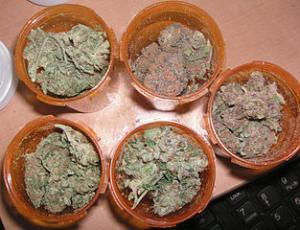This article was produced in collaboration with AlterNet and an earlier version appeared here.
The DEA's decision Thursday not to move marijuana from Schedule I of the Controlled Substances Act (CSA) ended months of speculation about whether the agency would finally act in accordance with an ever-increasing mountain of evidence of marijuana's medicinal utility and either schedule it less restrictively or deschedule it altogether.

Or the agency could have taken some other largely unpalatable stance, such as making cannibidiol a Schedule III substance (like synthetic Marinol) while leaving the whole plant Schedule I. In any case, any move short of descheduling it entirely and treating it like alcohol and tobacco, would have left marijuana medicalized, but not normalized.
The article below was written days before the DEA's decision, but we think the discussion remains germane for understanding the issues around rescheduling and why most reformers are disappointed, but not devastated by the agency's stubborn refusal to budge.
While the DEA may move to reschedule marijuana to a lesser schedule, keeping it within the purview of the Controlled Substances Act means that it would still be illegal, even for medical use in the absence of FDA approval. Even with FDA approval, a years-long process, it would still require a prescription to obtain, which would do nothing to address legal adult marijuana sales, production, or possession in the states. Removing it from the CSA, or descheduling, is what consumers and the industry are calling for, but that is the unlikeliest outcome, even though that's how we deal with the two most commonly used recreational drugs in the United States, alcohol and tobacco.
Schedule I is reserved for substances that have "no currently accepted medical use and a high potential for abuse," the DEA notes. "Schedule I drugs are the most dangerous drugs of all the drug schedules with potentially severe psychological or physical dependence." Those drugs include heroin, Ecstasy, LSD, peyote…and marijuana.
For more than 40 years, the DEA has blocked efforts to have marijuana placed in a more appropriate schedule, one that reflects the plant's medicinal uses as well as its relative harmlessness compared to other scheduled substances. But that stance has grown increasingly untenable in the face of state-level medical marijuana programs and in the face of an ever-larger mountain of research that fails to find significant serious health consequences from marijuana use.
Now, the DEA is considering a decision on the most recent rescheduling petition. Earlier this year, the agency told lawmakers it "hopes to release its determination in the first half of 2016," but that clearly didn't happen. Late in June, DEA spokesman Russ Baer said the agency is "in the final stages" of making its determination. And just last week, Baer said, "We're closer than we ever were. It's a very deliberative process."
If the DEA decides not to keep marijuana in Schedule I, the most obvious incremental move would be for it to bump it down one step to Schedule II, placing pot in the same category as morphine, cocaine, and methamphetamine. That could pave the way for eventually allowing doctors to prescribe it, and would remove some roadblocks to further research. It might open the way for broader changes in financial and business regulations, although a shift to Schedule III or greater would be needed to address the debilitating 280E tax provision, which prevents cannabusinesses from deducting ordinary expenses like rent or payroll.

Members of the marijuana industry, medical marijuana advocates, and marijuana consumer advocacy groups alike expressed skepticism about the DEA's willingness or ability to respond to the scientific evidence, uncertainty about what the agency was likely to do, and a demonstrated a pronounced -- if not unanimous -- preference not for rescheduling, but for descheduling.
Matthew Huron is a founder and former board member of the National Cannabis Industry Association and founder and current CEO of Good Chemistry Colorado, a vertically integrated cannabis company, as well as the co-founder of the Wellspring Collective, which caters to seniors with health challenges. Huron isn't exactly enthused by the prospect of Schedule II.
"Just to move it to Schedule II is more complicated than we're reading about," he said. "It might just be the molecule that gets rescheduled -- not cannabis. I don't think moving it to Schedule II would really have much effect on the states. It wouldn't hurt, but it wouldn't really help. Most of us in the industry would like to see it descheduled."
The medical marijuana advocacy group Americans for Safe Access (ASA) is pushing for Schedule II, but it's not relying on the DEA to make it happen.
"We don't have a crystal ball, and we don't know what the DEA will do, but based on past history, we don't have high hopes they will reschedule," said ASA spokesperson Melissa Wilcox. "It's possible they will de- or reschedule CBD and leave whole plant cannabis at Schedule I. Who knows? The DEA tends to ignore the science."
Schedule II "would remove barriers to scientists wishing to do research, so we know best how to use cannabis -- targeting, dosing, all the questions we haven't been able to study because it is such a pain to get research done now," said Wilcox.
But with little faith in the DEA, ASA is instead pushing for a legislative solution, the Compassionate Access, Research Expansion, and Respect States' Rights (CARERS) Act, also known as S. 683, which is currently bottled up in the Senate Judiciary Committee, chaired by octogenarian prohibitionist Sen. Chuck Grassley (R-IA).
The CARERS Act would move marijuana to Schedule II, as well as deschedule CBD, open up access to marijuana business banking, and end the NIDA monopoly on growing marijuana for research, among other provisions.
"We're pretty sure this could pass, but Grassley is the gatekeeper, and we're pushing hard to get him to schedule a vote," said Wilcox.

"We think marijuana should be removed entirely from the Controlled Substances Act," said Dale Gieringer, long-time head of California NORML, representing consumers and small growers in the nation's most populous state. "As a fallback position, we've been litigating since 1972 to get it rescheduled to Schedule II. If they do that, that would be good -- they'd only be 45 years overdue," he noted.
"From the standpoint of states that have state-legal suppliers, Schedule II doesn't accomplish a whole lot," Gieringer said. "Those state-legal suppliers wouldn't become federally legal; they'd have to first obtain FDA approval. Until that happens, everybody is an illegal producer of a scheduled drug under federal law," he said.
"Schedule II would allow doctors to write prescriptions -- but nobody could fill them," Gieringer noted. "There are international prescriptions and international suppliers, though. But the main impact would be doctors would feel better and cops couldn't argue that marijuana isn't a medicine. If they're trying to create a niche for existing legal medical marijuana state, putting it in Schedule II is like creating a square hole for a round peg."
Marijuana patients, consumers, and the industry are all waiting for the DEA to act, but aren't really holding out much hope it will do the right thing. And even the half-steps it might take, such as moving it to Schedule II or separating out CBDs for lower scheduling, aren't going to substantially alter marijuana's legal status or resolve the conflicts between state-level legality and federal marijuana prohibition. When it comes to rescheduling marijuana, there's just not that much there there.
This work by StoptheDrugWar.org is licensed under Creative Commons Attribution-ShareAlike 4.0 International
Comments
writing prescriptions
Marijuana rescheduling - not
same obama/same washington/same ONDCP
It can sometimes feel like we live in very heady times.Aside from the fact that Jimmy Carter was elected on a legalisation platform as was Jean Cretein in Canada.Both in the 1970's,when we felt the battles of the late 60's had earned us some well deserved respect.Cretien was a politicians/politician.He ws on his way out and had never understood why Ottawa politicians all smoked but told their constituents they would never allow it;s being made legal.Carter had good,clear plans and a program of operation.The US law enforcement crews went after a known coke user in his cabinet and that was the end of that.US law enforcement blackmail?This is the biggest part of how Amerika keeps the world under it's anti drug thumb.Blackmail,bribery,payoffs,unconstitutional laws,many that allow the CIA to flood Amerika's ghettoes with cheap,high quality heroin.Air America,Iran contra.afghan heroin to the east through the caucasus to Russia,eastern europe and Pakistan/Iran.Meanwhile,at home,obama continues his persecution of dispensaries and medical cannabis and is fighting to keep pot a shedule 1 drug?All so Shillary can get up on her once prohibitionist soap box and promise to change it to schedual 2.This is cynical insider politics at it's worst.
Add new comment